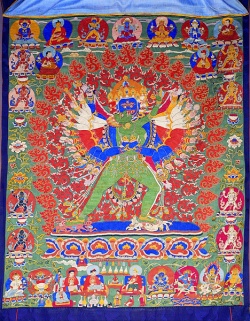Time and the Kalachakra - Indian astronomy
...the 16 Nityas along with the (36 consonant) letters which are the manifested 36 tattvas, and the Mantras which are formed by the letters, as also the Yantras are one with Time (Kala) - Tantrarajatantra XXV, Avalon
The fundamental basis of Indian astronomy is a simple expression: "Breath is Time".
This is outlined in older upanishads as well as in the astronomical works known as siddhantas. In ancient India there was no split between astronomy, spiritual life, and people. The purpose of astronomy was to relate the macrocosm to the microcosm. The Hindus were not addicted to stargazing for the purpose of giving new labels to stars, nor were they interested in applying spiritual concepts to technological ends. The scheme may originally have originated from Sumerian culture, which used base 60 and produces ephemerides superior to those used by the Victorians.
The Hindu measures of time are ideal or spiritual measures. Adepts of the Kalachakra were well aware of perturbations in planetary cycles, in the year and in the month. Consistent with this view is the concept that people are, like the real solar system, subject to fluctuations, perturbations and inequalities. The periods are based on the numbers 27, 54, 108, 360 and 21600, numbers which we find recurring again and again in tantrik texts.
That which is real is the respiration, say Sanskrit texts. A respiration consists of two halves, an inhalation and an exhalation. The meshing of time and astronomy and breath is the Kalachakra. Mahakala = Brahma = Time. The obstacles to Sun-Moon respiration, or equipose-breathing, are caused by conditioning. According to the Indian medical shastra, the ayurveda, food is of three types = impressions, breath, edibles.
Just as without food we are starved and die, and without oxygen we suffocate, so without impressions we could not survive. Wrong food affects us, faulty breathing starves the blood of oxygen, lack of impressions causes physiological disturbance.
Relating our own body to cosmology, our earth centre, our physical or planetary body, is sustained by food. Our emotional centre (Sol) is sustained by breath. Our intellectual centre (Moon) is sustained by impressions.
Speech is breath modulated by the physical organism in various ways -- depth of breathing, muscle tension, shape of mouth, shape of mental impressions. The Indian measure is that 10 long syllables make 1 breath. There are smaller subdivisions of time ending with the paramanu -- this is related to the time taken to sense an impression.
The goddess, or shakti, is the whole circle of the Zodiac, Time, the Sun, Moon and Planets, the Constellations, Breath (Prana) and Matrika (See, for example, Tripurasundari, on this site). All these factors are considered to be unified in the Nath tradition- Matrika Shakti rules all letters of the alphabet, all mantra, and all speech.
Words are said to have a delusive nature (Mahamaya Matrika) because the word itself, although it may contain a reference to an object is often surrounded by clusters or Kulas of lesser Shaktis, These lesser Shaktis themselves indicate other references to objects. These Shaktis include what are called 'associations of thought', clusters of sense impressions, connected perhaps by links which are unique to an individual.
Arc related to the zodiac
| Proportion | Arcsecs | Degrees | Aspect/Division |
|---|---|---|---|
| 21600/108 | 200 | 3d 20m | Navamsha |
| 21600/27 | 13020 | 13d 20m | Nakshatra |
| 21600/4 | 5400 | 90d | Square |
| 21600/2 | 10800 | 180d | Opposition |
| 21600 | 21600 | 360d/0d | Conjunction |
Breath
21600 = number of breaths day and night (= 24 hours) 10800 = solar, 10800 = lunar 1 breath = 4 seconds
Time
24 hours x 60 minutes = 1440 minutes
1440 minutes x 60 seconds = 86400 seconds 86400/21600 = 4 seconds = 1 breath
1 nadika of 24 minutes = 1440 seconds(=360 breaths) 1 solar year = 360 days = 8640 hours
1 solar month = 30 days = 720 hours
1 season = 60 days = 1440 hours
1 half-month = 15 days = 360 hours
Indian Measures
It is one of the conditions of a Kalpa (aeon) that in it the planets with their apsides and nodes must unite in 0 degrees of Aries -- therefore within each Kalpa a planet must make a certain number of revolutions.
One Chaturyuga = 1 kalpa/1000
10 long syllables = 1 Prana (breath = 4 seconds) 360 Pranas = 1 Nadika (=24 minutes)
60 Nadikas = 1 day
1 Chaturyuga = 4320000 solar years
A Yuga is divided into 4 parts:
Krtta Yuga = 1728000 solar years
Treta Yuga = 1296000 solar years
Dvapara Yuga = 864000 solar years
Kali Yuga = 432000 solar years
Each age has two twilights:
Krita Yuga
Dawn 144000
Day 1440000
Dusk 144000
Treta Yuga
Dawn 108000
Day 1080000
Dusk 108000
Dvapara Yuga
Dawn 72000
Day 720000
Dusk 72000
Kali Yuga
Dawn 36000
Day 360000
Dusk 36000
This means that one solar year = 1 day of the gods
One Kalpa (Aeon) = 1 day of Brahma
One Kalpa = 1 night of Brahma
Brahma's life = 100 years of these days = 864,000,000,000 divine years.
Note that the 'Kali Yuga', although taken to have an aeonic impact upon people's way of life, is nevertheless a fiction used for astrological computation: At the beginning of the Kali epoch (17th Feb 3102 BC) the mean places of the 7 planets are assumed to be at the beginning of the sidereal sphere at 0 degrees Aries. By calculating from this epoch the mean positions of Sun, Moon and planets are obtained. The evidence seems to indicate that the start of the epoch was determined retrospectively, i.e. based on a later epoch and worked backwards to a time when Sun, Moon and planets were in 0 degrees Aries.
